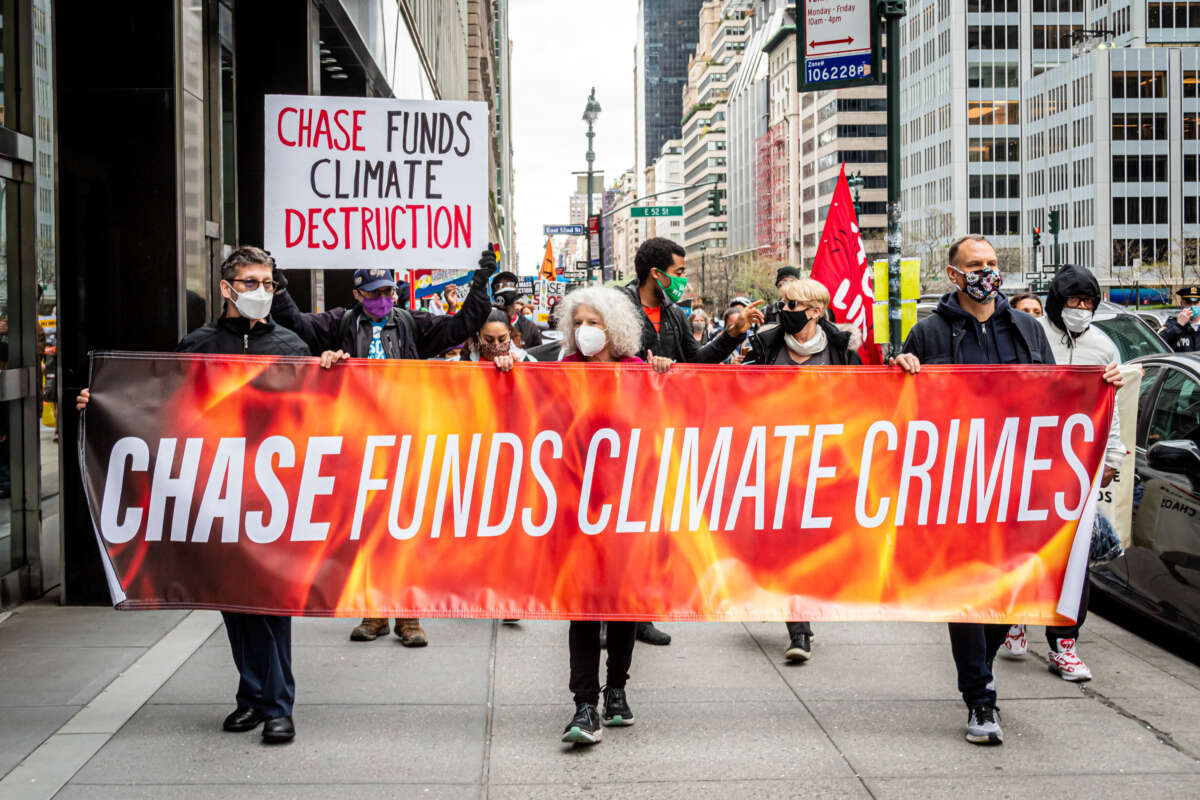Honest, paywall-free news is rare. Please support our boldly independent journalism with a donation of any size.
It’s been a little over a year since JPMorgan Chase boasted that its business practices would yield net-zero carbon emissions by 2050, and it’s abundantly evident now that the skeptics are owed an apology.
The bank, which has long been known for its ties to fossil fuel producers, made the pledge back in October 2021, and tried to sell it by releasing a statement from an employee with the title “global sustainability officer” gushing about the commitment and “the ambition for greater climate action.”
“Climate change is a critical issue of our time, and we are committed to doing our part to address it,” said Marisa Buchanan, the global sustainability officer, in an announcement made ahead of the United Nations climate change summit in Glasgow that November. Weeks later, with no fanfare or press release, JPMorgan Chase lent $788 million to Vedanta Resources, a company whose activities include the development of coal mines in India, for the right to securitize and sell the debt on financial markets.
The bank’s decision to make this loan just weeks after announcing its net-zero pledge was highlighted in a report published on January 17, 2023, by an environmentalist organization called Reclaim Finance. The report exposed the lack of credibility behind financial industry climate pledges, like those made by JPMorgan Chase, and spotlighted the failures of a UN-affiliated coalition called the Glasgow Financial Alliance for Net Zero (GFANZ). The purported aim of the GFANZ coalition, which was established in April 2021, is to help governments around the world meet emission reductions targets under the UN-backed Paris Climate Accords. Members of the alliance claim to collectively manage $150 trillion, or 40 percent of all private financial assets worldwide.
But as illustrated by the Reclaim Finance study, which details numerous deals in which GFANZ members and companies helped ramp up coal production, the alliance’s impact on business practices has been minimal. In August 2022, GFANZ leaders called on members to refrain from making any new investment that would increase coal production, singling out the industry for criticism because it is “the single largest source of global carbon emissions.”
“We want to be unequivocal on this point: there is no rationale for financing new coal projects,” the GFANZ leaders said. “The consensus, across all rigorous science-based pathways, is that new coal capacity (both extraction and power generation) is inconsistent with achieving net zero and limiting global warming to 1.5 degrees C.”
The Paris Climate Accords, which GFANZ was formed to support, declared that the worst effects of climate change could be avoided if the average post-industrial global temperature doesn’t increase by more than 1.5 degrees Celsius by the year 2050.
Reclaim Finance also noted the emerging scientific consensus that governments and businesses must refrain from all new oil and gas production in order to meet the Paris benchmarks. But GFANZ foreclosed on that possibility as three major U.S.-based banks — JPMorgan Chase, Bank of America and Morgan Stanley — threatened to walk away from the alliance. In September 2022, the organization mollified the trio by quietly reversing a requirement forcing members to back the UN’s Race to Zero, a campaign that mandates “transparent action plans and robust near-term targets.”
As a result, the report noted, investment capital continues to threaten the well-being of billions of people instead of advancing the cause of decarbonization by “building out renewables and batteries, developing new electric powered arc-steel furnaces, or helping to pay for a just phaseout of coal and gas power plants.”
“In continuing to finance fossil expansion, GFANZ members are sending a message to the rest of the finance sector, to industry, and to governments, that as long as the fossil companies want to keep destroying the climate upon which we all depend, that the finance will be there to support them,” the study added. Between the date of their ascension to the group and August 2022, GFANZ banks extended at least $269 billion in credit to companies expanding their fossil fuel output, Reclaim Finance found.
The report called on GFANZ rules to be revised to force members “to phase out the provision of financial services for fossil fuel expansion,” saying such changes were needed for the framework “to be seen as credible.”
But while the framework may lack credibility, members are able to score public relations points, which appears to be one key motivating factor behind banks’ environmental commitments to the public. In October 2022, Truthout reported on how the Bank Policy Institute, a trade association representing the largest U.S.-based banks with especially close ties to JPMorgan Chase, called on regulators to refrain from ensuring that banks’ climate pledges are consistent with their business practices.
In public comments on the same rule proposal issued last year, other finance industry lobbying groups noted that the Securities and Exchange Commission (SEC) is well within its right to punish publicly traded companies that misrepresent material facts about their practices. Truthout asked the SEC if it was aware of the Reclaim Finance report and if its findings raise concerns about securities fraud. A representative of the agency said it declines to comment on external reports.
Media that fights fascism
Truthout is funded almost entirely by readers — that’s why we can speak truth to power and cut against the mainstream narrative. But independent journalists at Truthout face mounting political repression under Trump.
We rely on your support to survive McCarthyist censorship. Please make a tax-deductible one-time or monthly donation.
